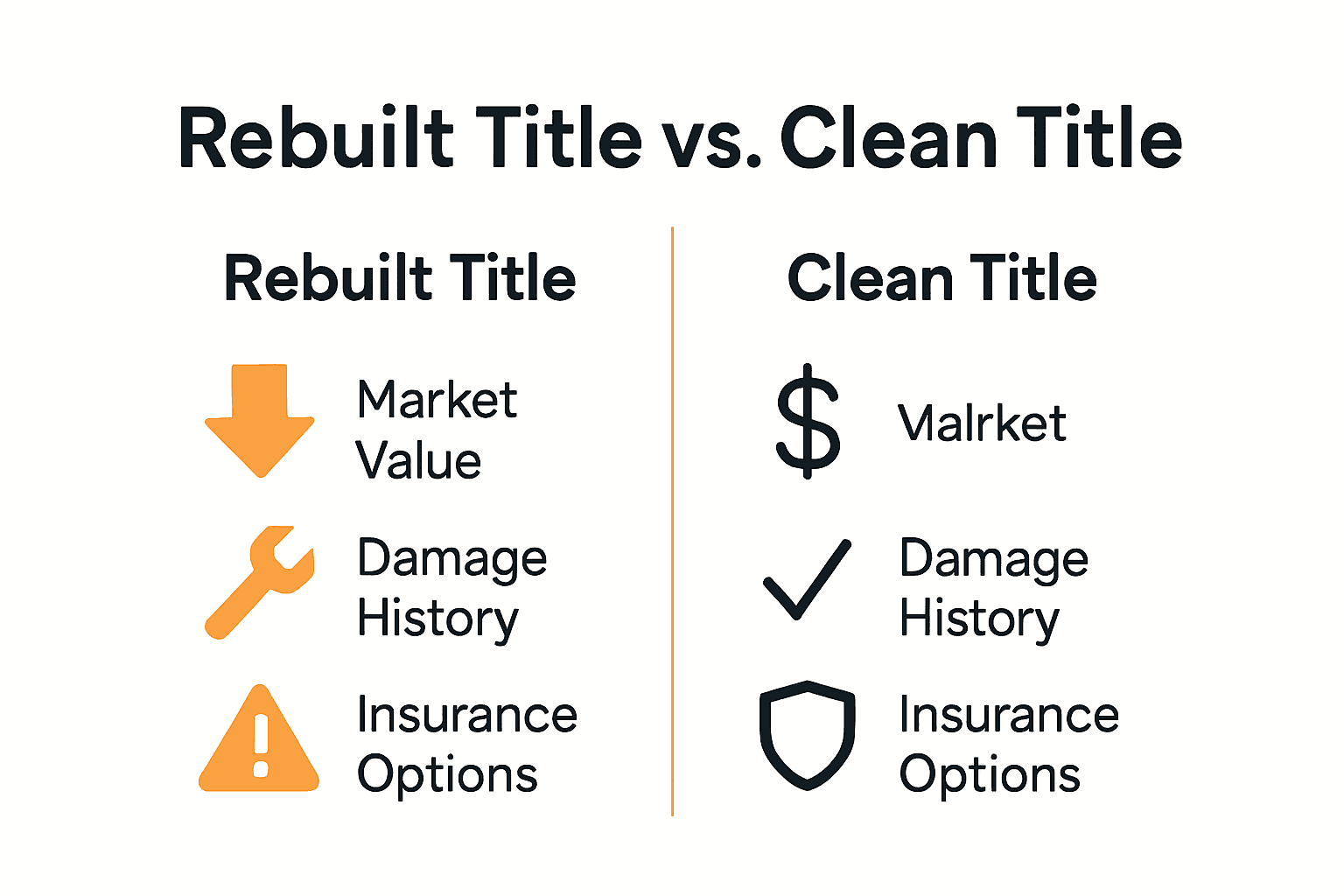What Does a Rebuilt Title Mean? Complete Guide
November 2, 2025
Did you know that vehicles with rebuilt titles can cost up to 60 percent less than those with clean titles? Many drivers pass on these cars, often due to confusion or myths about their safety. Yet, rebuilt title vehicles go through tough repairs and inspections before returning to the road. Understanding what a rebuilt title truly means helps car buyers spot hidden value and avoid common mistakes.
Table of Contents
- Defining Rebuilt Titles And Common Misconceptions
- How Vehicles Receive A Rebuilt Title Status
- Rebuilt Title Vs. Clean Title: Key Differences
- Legal Requirements And State Regulations
- Risks, Benefits, And Smart Buying Tips
Key Takeaways
| Point | Details |
|---|---|
| Understanding Rebuilt Titles | A rebuilt title indicates a vehicle has been repaired and passed safety inspections after being declared a total loss. |
| Benefits of Rebuilt Titles | Vehicles with rebuilt titles can cost 30-50% less than clean title vehicles, presenting budget-friendly options for buyers. |
| Importance of Documentation | Buyers must demand thorough repair documentation and conduct pre-purchase inspections to ensure safety and reliability. |
| Legal Requirements Vary by State | Rebuilt title regulations differ significantly by state, necessitating awareness of local laws before purchasing. |
Defining Rebuilt Titles and Common Misconceptions
A rebuilt title represents a vehicle that has been professionally repaired after being previously declared a total loss by an insurance company. According to Chase, a rebuilt title indicates that the vehicle has been successfully repaired and passed state inspections, making it legal to drive again.
Contrary to popular belief, a rebuilt title doesn’t automatically mean the car is damaged or unreliable. These vehicles undergo comprehensive repair processes and must meet strict state safety standards before receiving their designation. Many rebuilt title vehicles result from minor incidents like hail damage, theft recovery, or cosmetic issues - not just major accidents.
Common misconceptions about rebuilt titles often stem from misunderstandings about their history and restoration process. While some people assume these vehicles are inherently risky, the reality is more nuanced. For deeper insight into these myths, check out our guide on the top myths about rebuilt title cars.
Key characteristics of rebuilt title vehicles include:
- Professionally repaired and state-inspected
- Typically priced 30-50% lower than comparable clean title vehicles
- Require thorough documentation of repair history
- Must pass comprehensive safety examinations
Understanding rebuilt titles requires looking beyond surface-level assumptions. These vehicles represent opportunity - a chance to own a reliable car at a significantly reduced price point, provided buyers conduct proper due diligence.
How Vehicles Receive a Rebuilt Title Status
The journey from a damaged vehicle to a rebuilt title is a meticulous process that involves multiple critical steps. According to Experian, a vehicle with a salvage title must be professionally repaired and pass comprehensive state safety inspections before being issued a rebuilt title, which officially indicates the car is safe to drive.
CarGurus explains that the rebuilt title process typically involves several key stages: first, an insurance company declares the vehicle a total loss, then skilled mechanics undertake extensive repairs to restore the vehicle’s functionality and safety. These repairs aren’t just cosmetic - they involve thorough mechanical and structural assessments to ensure the vehicle meets rigorous roadworthiness standards.
To transform a salvage vehicle into a rebuilt title vehicle, owners must navigate a complex approval process. This usually requires:
- Comprehensive repair documentation
- Professional mechanical inspections
- Detailed repair history records
- Successful state-mandated safety examinations
For those interested in understanding the nuanced process of vehicle retitling, our guide on how rebuilt cars are retitled offers an in-depth exploration of this intricate journey. The rebuilt title process isn’t just about fixing a car - it’s about verifying and certifying that a previously damaged vehicle can once again be a safe, reliable mode of transportation.
Rebuilt Title vs. Clean Title: Key Differences
Understanding the distinction between rebuilt titles and clean titles is crucial for any savvy car buyer. According to ReVroom, rebuilt titles typically result in a market value drop of 40-60% compared to clean titles, which signify a vehicle with no significant damage history. This substantial price difference reflects the comprehensive repairs and inspection process a rebuilt title vehicle undergoes.
The primary difference lies in the vehicle’s past. A clean title indicates a car that has never been declared a total loss, maintaining its original value and presumed structural integrity. In contrast, a rebuilt title represents a vehicle that was previously totaled, professionally repaired, and certified as roadworthy. While this might sound risky, many rebuilt title vehicles offer exceptional value for budget-conscious buyers willing to do their due diligence.
Key differences between rebuilt and clean titles include:
Here’s a comparison of rebuilt title and clean title vehicles:
| Feature | Rebuilt Title | Clean Title |
|---|---|---|
| Market Value | 40-60% lower price | Full market value |
| Damage History | Previous total loss, repaired | No significant damage |
| Inspection Requirements | Extensive safety/state inspections | Standard inspections |
| Repair Documentation | Required for title approval | Not typically required |
| Insurance Options | More limited, higher rates May be harder to secure |
Broad options, easier approval |
| Resale Potential | Lower resale value | Higher resale value |
| Buyer Due Diligence | Essential; more research needed | Less complex research |
- Market Value: Rebuilt titles are typically 40-60% less expensive
- Insurance Considerations: Clean titles often have more straightforward insurance options
- Resale Potential: Clean titles generally retain higher resale values
- Inspection History: Rebuilt titles require more extensive documentation of repairs
For those wanting to dive deeper into the nuanced world of vehicle titles, check out our comprehensive guide on the difference between salvage and rebuilt titles. Understanding these distinctions empowers buyers to make informed decisions, balancing potential savings with comprehensive vehicle assessment.

Legal Requirements and State Regulations
Rebuilt title regulations vary significantly across different states, creating a complex landscape for vehicle owners and buyers. Each state maintains its own unique set of requirements for how a vehicle can be retitled after substantial repairs, making it critical to understand local guidelines before purchasing or selling a rebuilt title vehicle.
The process typically involves multiple layers of legal scrutiny. Most states require a comprehensive vehicle inspection that goes beyond standard safety checks. This inspection aims to verify that all repairs meet minimum safety standards and that the vehicle is roadworthy. Owners must provide detailed documentation of repairs, including original damage assessments, parts replacement records, and professional mechanic certifications.
Key legal considerations for rebuilt titles include:
- Mandatory state-level safety inspections
- Detailed repair documentation requirements
- Professional mechanical certification
- Specific title branding procedures
- Disclosure obligations during vehicle sales
To navigate this intricate regulatory environment, potential buyers should always consult our guide on rebuilt title regulations to understand the specific requirements in their state. While regulations can feel overwhelming, they ultimately serve to protect consumers and ensure that rebuilt vehicles meet critical safety standards before returning to the road.

Risks, Benefits, and Smart Buying Tips
Purchasing a rebuilt title vehicle requires carefully weighing potential advantages and risks. According to Experian, while these vehicles can offer significant cost savings, buyers must be aware of potential challenges such as hidden damage and insurance complications. The key is approaching the purchase with a strategic, informed mindset.
AutoZone highlights that rebuilt title vehicles are often priced attractively but come with important considerations. Potential buyers should understand that these vehicles may present difficulties in securing financing and require more extensive due diligence compared to traditional used cars.
Smart buying tips for rebuilt title vehicles include:
- Always get a professional pre-purchase inspection
- Request complete repair and damage history documentation
- Verify the vehicle’s structural integrity
- Check insurance availability beforehand
- Compare repair costs against potential savings
For budget-conscious buyers looking to navigate the rebuilt title market confidently, check out our guide on understanding cars with accident history. Remember, a rebuilt title isn’t automatically a red flag - it’s an opportunity for savvy buyers who are willing to do their homework and make an informed decision.
Discover a Smarter Way to Buy Rebuilt Title Vehicles
Navigating rebuilt title cars can feel overwhelming. You want the savings but worry about hidden history and safety. The article perfectly captures these concerns, highlighting the need for transparency, thorough repair documentation, and careful inspection. We understand you want a reliable vehicle at a great price without endless guesswork or costly detective work.
At ReVroom, we make buying rebuilt title cars straightforward and safe. Unlike traditional used car marketplaces, every listing on ReVroom.org comes with clear accident history and photos showing the vehicle’s condition before repairs. This upfront transparency lets you spot the best deals and avoid surprises. Our marketplace honors the uniqueness of rebuilt title vehicles while empowering buyers to make confident decisions, reflecting the article’s focus on balancing value and due diligence.

Ready to save up to 50 percent compared to clean title prices while buying with trust and clarity? Visit ReVroom now and explore a curated selection of carefully vetted rebuilt title cars. Go beyond just reading about titles and jump into a marketplace built exactly for this growing, misunderstood segment. Your next car is waiting with all its stories told.
Explore more about your options and why rebuilt title cars can be the right fit by checking out our resources like What Does a Rebuilt Title Mean? Complete Guide and watch how transparent history changes the game.
Frequently Asked Questions
What is a rebuilt title?
A rebuilt title indicates that a vehicle has been professionally repaired after being declared a total loss by an insurance company and has passed state inspections, making it legal to drive again.
What are the main differences between a rebuilt title and a clean title?
The primary differences include market value, damage history, inspection requirements, and insurance options. Rebuilt titles usually have a significantly lower market value and require extensive repair documentation compared to clean titles, which have no significant damage history.
What are the risks of buying a rebuilt title vehicle?
Risks include potential hidden damages, complications in securing financing, and more challenging insurance options. Buyers should conduct thorough due diligence, including obtaining a pre-purchase inspection and verifying the vehicle’s repair history.
How does a vehicle obtain a rebuilt title status?
A vehicle typically obtains a rebuilt title by undergoing professional repairs, passing a comprehensive safety inspection, and meeting specific state regulations. Detailed documentation of repairs is essential for the title approval process.
